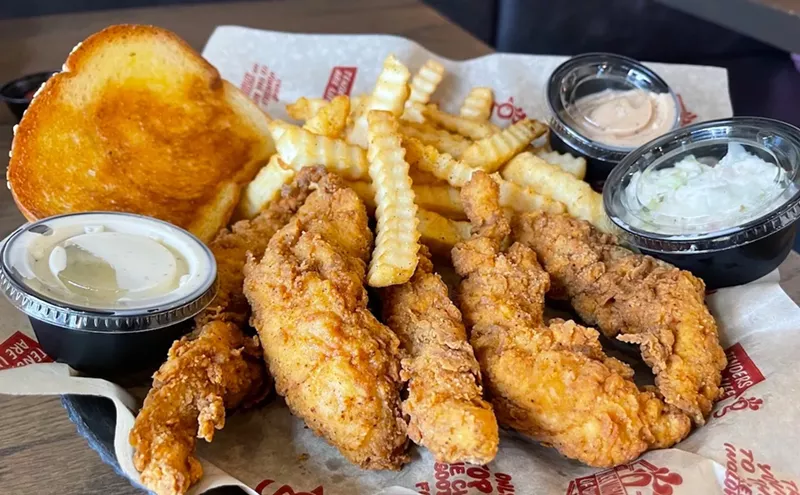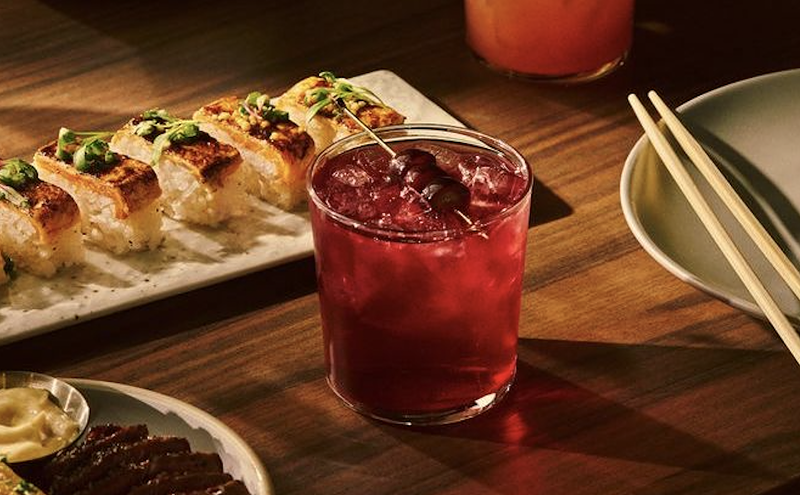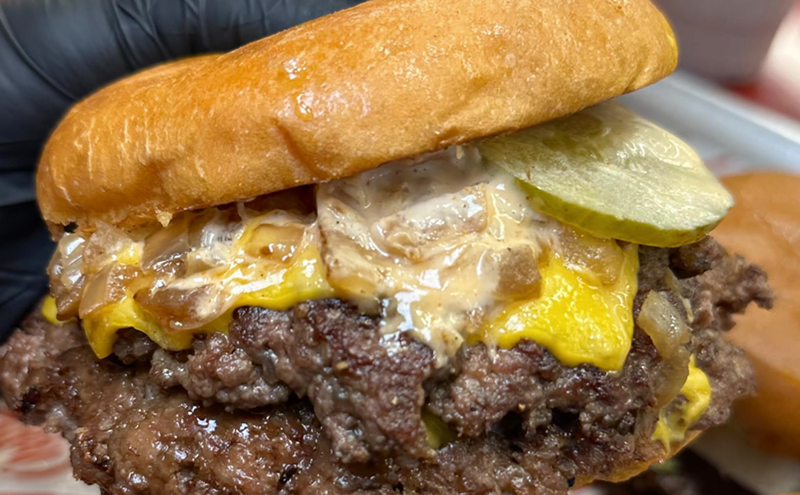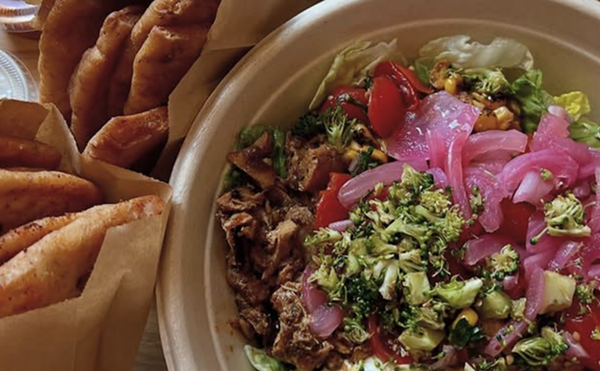So you're a homebrewer in Miami and you want to start a brewery. If population density is any indicator, the market is ripe compared to Asheville, North Carolina, a city of 83,000 people that has at least a dozen breweries (including brewpubs) and counting.
Eddie Leon, 44, founder of Most Wanted Brewery in Doral, is one of two brewery startups in Miami-Dade. Along with Wynwood Brewing Company, Most Wanted is on the rise.
See also:
- Misfit Home-Brewers Help Lead Miami's Craft Beer Invasion
According to the Brewer's Association, a trade group, the financial rate of growth in the craft beer industry was 15 percent for 2010 and 2011. By mid-2012, that number was 14 percent. And the retail value of craft beer increased by more than $1 billion between 2010 and 2011.
With
numbers like those, a craft brewery investment might be the way to go,
even in a sluggish economy. That's the way Leon sees it, which
is why he decided to take his leap of faith. But for his middle-class family of four, it's a
huge financial gamble.
Leon earned a master's degree in architecture from Florida International University and runs his
own digital graphic design business. He got back into homebrewing after a several-year hiatus before deciding to go commercial.
Many homebrewers might have similar ideas.
But there is a process, a rite of passage if you will, to
becoming a professional brewer. There's plenty of red tape and many potential financial setbacks. So far, everything is clicking for Leon, having recently acquired a brewing space at 10400 NW 33rd St. in Doral.
New Times: If you're a homebrewer and want to start a brewery, what is the first step?
Eddie Leon:
If you're a first-time business owner, you should definitely have a
business plan that sort of lays out what is it going to cost you and at
what point you're going to generate enough profits to cover your costs.
Ultimately, you're putting all of your money into a machine that needs
to
generate revenue, and obviously nobody has endlessly deep
pockets, so you need to be able to do something with the gamble that
you're going to play that will sustain the growth of your business.
What goes into making a business plan for a microbrewery?
Anybody can do a microbrewery. First decide if you want to be a brewpub or a
production brewery, or a nano-brewery. A brewpub can make and sell beer with its food, and that's it. A production brewery can distribute anywhere but cannot sell food. The nano-brewery is a smaller and more affordable brewing system.
These are popular start-up business models, but the big problem is they produce much less beer while
working around the clock for not much money. You will
barely break even and reach full production capacity in a few months. It's all about economy of scale. A nano-brewery is going to
be less expensive, but the rate of failure is higher, so bigger is
better. From what I hear, if you're a homebrewer who brews a lot of
beer and wants to put it on the shelves and do it without very much
money and to do something the size of a Wynwood or Most Wanted, you're going to need at least a half-million dollars to do it. In the
brewing community, that's the general rule of thumb, and it could easily
go up to $1 million.
How do you gain wide appeal?
You have to go to a lot of festivals. I decided that I preferred more of the brand-building idea. This idea of
a brand that people can create a connection with, a lifestyle brand,
that can relate to the beers that we're making, and these would be beers
that are going into distribution. The important thing is that you need at least one beer that has somewhat
wide appeal so that most people will be able to drink it. And it has to
be a sessionable beer.
What is a "sessionable" beer?
A
sessionable beer is a beer that you can have, in one sitting, multiple
amounts. Let's say if you're watching a football game, you might want a beer that you can have a few bottles of as opposed to a very strong
dark beer that you can drink only half a bottle. It's good to have a
beer that's sessionable because that could be your flagship beer that
you can basically sell a lot of and it's easy to produce. A lot of great
breweries are able to
experiment with other beers because of the profits of their flagships.
To that I recommend homebrewers continue doing the great beers all of their friends love, but also keep in mind that those beers
might not necessarily be profitable. They need to have a least one good
beer that can sustain their growth.
What about beer recipes?
They
must be approved by the federal government. Certain ingredients on a list
you can use, but anything not on the list must be approved. Typically
anything that's already on the market shouldn't be an issue.
What about brewing space?
You
have to consider zoning restrictions, which are different in every
city. Check with your local laws on that. Once you have found a desired
location, contact your city and ask for a zoning
verification letter, which is critical. The city does the research to
determine whether a brewery can be zoned in a particular location. If
yes, then negotiate final lease terms with your landlord. Then get permission
from your landlord in
writing that he approves of having a brewery
on property. Also find out if a tasting room is allowed, which is critical
because up to 50 percent of revenue comes from the tasting room. Then you
confirm other technical things like appropriate electrical power
availability for equipment used. Typically a large brewing system requires three-phase power,
natural gas, and appropriate sewage and water connections. It's a lot
of steps, a lot of research, but you have to do your homework. Once you
commit, you don't want to break a lease where
you're completely liable for a few years' worth of rent.
What obstacles should one expect when starting a brewery?
Red
tape can be a very big problem for start-up breweries, especially in
Florida, where brewing is not necessarily a traditional thing. Other
than zoning issues, the next
big issue is making sure the building can hold the equipment. A regular
concrete floor cannot hold vessels that heavy, so you need to
rip out the floor and pour at least a foot of reinforced concrete.
First it's getting through the red tape, and it's making sure
you have a good location, and probably the biggest roadblock for most
homebrewers who want to go to the next level is cash. It's a very
cash-intensive operation. It's not cheap, and most people don't have a
half-million dollars to do something like that.
There is one
more thing: permits. Leon has not yet applied for his permits,
but several are required to operate a brewery. The Florida Brewer's Guild
website has a handy guide on permits. Aside from the federal brewer's permit, there is the CMBP
(brewpub) and CMB (manufacturer) licenses. The Florida permits cost $500 per year for brewpubs and
$3,000 per year for manufacturers.
Get more David Minsky on Twitter @DavidAMinsky and Instagram @daveminsky.
Follow Short Order on Facebook, on Twitter @Short_Order, and Instagram @ShortOrder.












